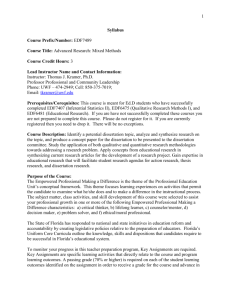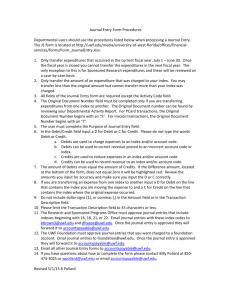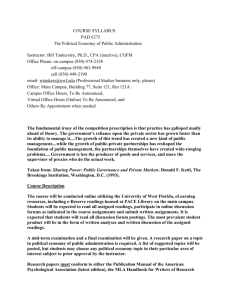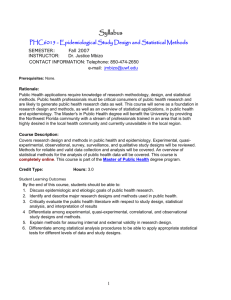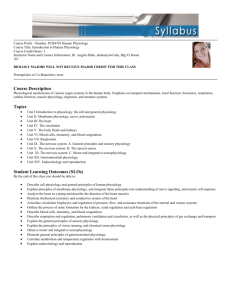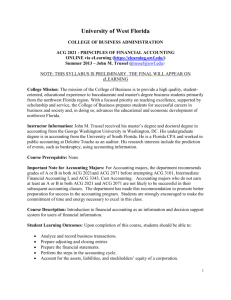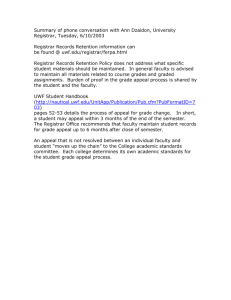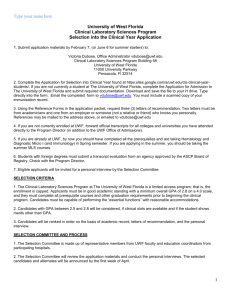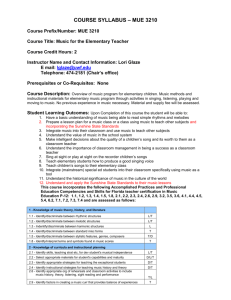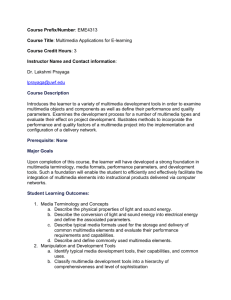Proctored Midterm Exam - University of West Florida
advertisement
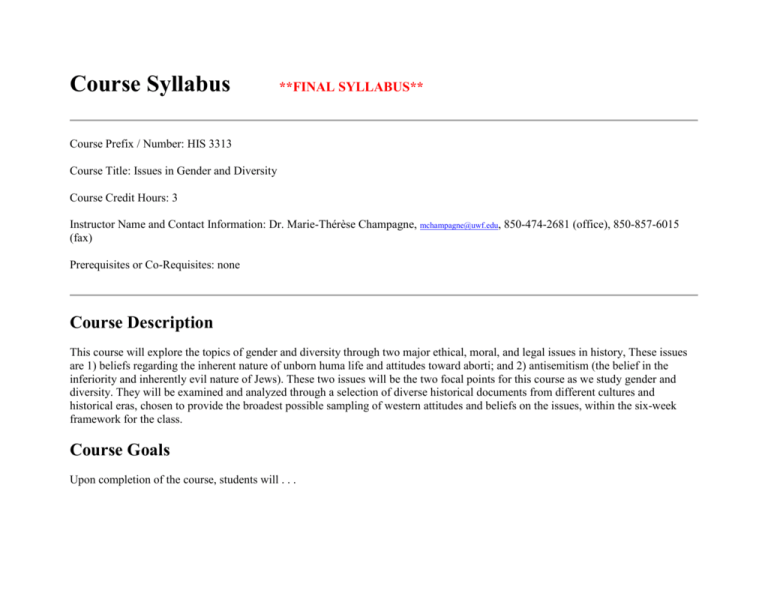
Course Syllabus **FINAL SYLLABUS** Course Prefix / Number: HIS 3313 Course Title: Issues in Gender and Diversity Course Credit Hours: 3 Instructor Name and Contact Information: Dr. Marie-Thérèse Champagne, mchampagne@uwf.edu, 850-474-2681 (office), 850-857-6015 (fax) Prerequisites or Co-Requisites: none Course Description This course will explore the topics of gender and diversity through two major ethical, moral, and legal issues in history, These issues are 1) beliefs regarding the inherent nature of unborn huma life and attitudes toward aborti; and 2) antisemitism (the belief in the inferiority and inherently evil nature of Jews). These two issues will be the two focal points for this course as we study gender and diversity. They will be examined and analyzed through a selection of diverse historical documents from different cultures and historical eras, chosen to provide the broadest possible sampling of western attitudes and beliefs on the issues, within the six-week framework for the class. Course Goals Upon completion of the course, students will . . . understand the historical background to Antisemitism from the earliest texts (c. 200 BC) that reveal attitudes about the Jews, through the Holocaust, and up to present-day attitudes. Students understand how to analyze the primary and secondary sources in their historical context, how to relate the development of antisemitism and historical ramifications of that attitude, and how to discern evidence of antisemitism today. understand the history of attitudes toward unborn human life from the earliest texts (c. 1750 BC) that reveal attitudes toward its value and towards abortion, to present-day perspectives from secular and religious perspectives. appreciate the value of objective discussion of the primary and secondary sources in order to understant he past in a scholarly manner. have improved their scholarly research and writing skills. Program Goals HIS 3313, Issues in Gender and Diversity, is a core course in the Women's and Gender Studies major, and the Diversity Studies major. As a special topic course, HIS 3313 focuses on two specific topics for in-depth study from a historical perspective. This course also fulfills the requirement for an upper-level History course for the History major, and minor. Topics The Early History of Antisemitism Antisemitism in Europe: the Early Modern Age to 1930s Germany The Holocaust and Antisemitism Today Ancient and Medieval Attitudes toward Unborn Human Life and Abortion: Legal, philosophical, and Moral Perpectives Early Modern and Modern Attitudes and Legal Actions Regarding Abortion Twentieth- and Twenty-first-centuryViews and Legalities--Politicization of the Issue? Student Learning Outcomes (SLOs) Students will: 1. investigate the historical development of anti-Judaism and antisemitism from the late Roman Republic, Roman Empire, and Christian Europe, through late medieval and early modern Europe, to 1930s and 1940s Germany and the Holocaust. This investigation will end with contemporary evidence of antisemitism and cultural sensitivity in America to such accusations. 2. explore the history of cultural and religious perspectives on unborn human life and any legal restrictions on acts that would affect that life. This exploration will extend from ancient Mesopotamian, Greek, and Roman law and philosophy, Biblical Judaic laws, and medieval and modern Christian law, through two late-twentieth-century documents: The Roe v. Wade Supreme Court Decision and encyclicals of the Roman Catholic Church dealing with preserving and ending unborn human life. The course will conclude with current perspectives and issues in the abortion debate in America today. 3. critically analyze primary sources dealing with these two topics, which range from the second millennium BCE to the present. Students will practice the mechanics of writing and objective historical analysis with primary source essays. 4. conduct scholarly research on a specific topic using the online resources of the UWF Library and produce an annotated bibliography in Turabian format. 5. participate in online class discussions on specific topics each week, and practice discussing potentially troubling topics in an objective, scholarly, and professional manner. Texts / Materials Required texts: Bergen, Doris L. War & Genocide, A Concise History of the Holocaust. 2nd edition. Rowman & Littlefield Publishers, 2009. ISBN: 9780742557154 (paperback), 9780742557161 (eBook). Hochstadt, Steve. Sources of the Holocaust. Palgrave-Macmillan, 2004. ISBN: 978-0333963456 (paperback). Pope Paul VI. Humanae Vitae: Encyclical Letter of His Holiness Paul VI. Igna Books, 2002. ISBN: 978-0898707281 (also available at http://www.vatican.va/holy_father/paul_vi/encyclicals/documents/hf_p-vi_enc_25071968_humanae-vitae_en.html). Rampolla, Mary Lynn. A Pocket Guide to Writing in History. 7th edition. Bedford/St. Martin’s, 2012. ISBN: 9780312610418 (paperback). US Supreme Court. Roe v. Wade. Bibliobazaar, 2007. ISBN: 978-1434698209 (also available at http://caselaw.lp.findlaw.com/cgibin/getcase.pl?court=us&vol=410&invol=113). Other online primary sources will be utilized from the Internet Medieval Sourcebook and the Internet Modern History Sourcebook Required Materials: Reliable, daily internet access (broadband is recommended) Activated UWF ArgoNet E-mail Account Access to eLearning through Myuwf.edu. Grading / Evaluation Assessment of your progress or lack of progress in the course is determined through the following assignments: Weekly Essays (4) 25% Discussion Board (a minimum of 3 posts/week x 6 weeks) 25% Midterm Exam 25% Annotated Bibliography 25% For a more detailed look at the grading scheme, go to "Grades" under "Assessments." Check your grades often throughout the sixweeks of the course so that you are aware of your standing in the course. Letter grades will be assigned as follows: 93% or better 90% to 92% 87% to 89% 83% to 86% 80% to 82% A AB+ B B- 77% to 79% 73% to 76% 70% to 72% 60% to 69% 59% or less C+ C CD F Attendance Policy Since this is a completely online class, your strong commitment to completing the weekly readings and assignments, and your participation in the Discussion Board are crucial. Active, daily participation, including checking your UWF email, will give you the best chance for success. Do not wait until the last minute to submit assignments or participate in the Discussion Board. When the dropboxes on eLearning and Turnitin.com close, you will not be able to submit your assignment and will not earn any points for it. Lack of planning on your part is not an appropriate excuse for extending any deadline. Minimum Technical Skills and Special Technology Utilized by Students This course is totally online. All instructional content and interaction takes place over the WWW. In addition to baseline word processing skills and sending/receiving email with attachments, students will be expected to search the internet, research through the UWF Library Databases, and upload / download files. In addition, students may need one or more of the following plug-ins: Adobe Acrobat Reader: http://www.adobe.com/products/acrobat/readstep2.html PowerPoint Viewer: http://www.microsoft.com/downloads/details.aspx?FamilyID=048DC840-14E1-467D-8DCA19D2A8FD7485&displaylang=en Windows Media Player: http://windows.microsoft.com/en-US/windows/download-windows-media-player QuickTime Player: http://www.apple.com/quicktime/download/ Real Player: http://www.real.com/realplayer/search Adobe Flash Player: http://get.adobe.com/flashplayer/ Configure your computer for Online Room (Elluminate Live!) sessions: http://support.blackboardcollaborate.com/ics/support/default.asp?deptID=8336&task=knowledge&questionID=1279 Expectations for Academic Conduct / Plagiarism Policy Each student is expected to follow strictly the UWF Student Code of Conduct and compose or create his/her own work. First read over the section on Academic Misconduct in the UWF Student Handbook and the UWF Plagiarism Policy (both are under "Student Support Resources"). Then complete the Academic Integrity Module, listed under "Important Course Information." Finally, after completing those two steps, complete and submit the following statement to our course graduate assistant, Natalie Ray, at ner5@students.uwf.edu: I have read the UWF Code of Student Conduct, including the section on Academic Misconduct in the Student Handbook, and the UWF Plagiarism Policy. I understand them completely. I agree to abide by them and to follow the highest standards of academic honesty. Type your full name after the statement and send it (fax to 850-857-6015, Attention: Dr. Champagne, or scan and email to mchampagne@uwf.edu) by September 30. None of your work or tests will earn any points until you do so. Proctored Midterm Exam History Department policy stipulates that you must take at least one proctored test in this online course. That will be the midterm exam. For those of you in the vicinity of UWF, it will be given on campus in the Library Classroom (John C. Pace Library, first floor) on Monday, 9/16/13 from 10:30 to 12 noon and Tuesday, 9/17/13 from 3:00-4:30 p.m. There is no need to reserve a spot to take it at one of those times. Bring a picture ID. Arriving 30 minutes or more after the start of the exam makes you ineligible to take it. You will take it completely on the computer. If you do not live close to UWF, you can arrange to take your exam at our Emerald Coast campus. For those of you around the country and in other parts of the world, you must arrange to take your exam with a proctor or with ProctorU as soon as possible after the start of the semester. Information on both of those alternatives can be found under "Student Support Resources," "eLearning Support for Students." A proctor can be found by inquiring at a local library, university, or on your military base. That proctor must be preapproved by the instructor through specific paperwork. TurnItIn UWF maintains a university license agreement for an online text matching service called TurnItIn to determine the originality of student papers. I require every assignment be submitted to both the Dropbox on eLearning and to TurnItIn.com. If you submit your paper to TurnItIn, it will be stored in a TurnItIn database for as long as the service remains in existence. If you object to this storage of your paper: You must let me know by day 5 (September 30) of this class. I will then utilize other services and techniques to evaluate your work for evidence of appropriate authorship practices. If you have no objections, go to "TurnItIn.com Information" under "Important Course Information" for further directions for enrolling in TurnItIn.com. Each assignment (essays and bibliography) must be submitted to the Dropbox on eLearning andto Turnitin.com in order to earn any points. Do not wait until the last minute to submit! Assistance for Students with Disabilities The University of West Florida supports an inclusive learning environment for all students. If there are aspects of the instruction or design of this course that hinder your full participation, such as time-limited exams, inaccessible web content, or the use of noncaptioned videos and podcasts, reasonable accommodations can be arranged. Prior to receiving accommodations, you must register with the Student Disability Resource Center (SDRC) at http://uwf.edu/sdrc/internal/. Appropriate academic accommodations will be determined based on the documented needs of the individual. For information regarding the registration process, email sdrc@uwf.edu or call 850.474.2387. Accessibility Resources Follow this link for information on accessibility features in eLearning. Follow this link for information on accessibility features in UWF's Learning Management System (LMS), Desire2Learn. Weather Emergency Information In the case of severe weather or other emergency, the campus might be closed and classes cancelled. Official closures and delays are announced on the UWF website and broadcast on WUWF-FM. WUWF-FM (88.1MHz) is the official information source for the university. Any pertinent information regarding closings, cancellations, and the re-opening of campus will be broadcast. In the event that hurricane preparation procedures are initiated, the UWF Home Web Page and Argus will both provide current information regarding hurricane preparation procedures, the status of classes and the closing of the university. Emergency plans for the University of West Florida related to weather or other emergencies are available on the following UWF web pages: Information about hurricane preparedness plans is available on the UWF web site: http://uwfemergency.org/hurricaneprep.cfm Information about other emergency procedures is available on the UWF web site: http://uwfemergency.org/
